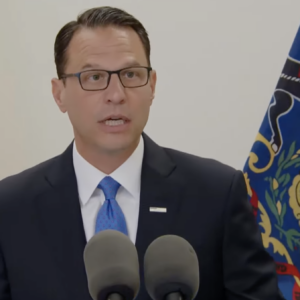Pennsylvania Senate Republicans want to know if Democratic Gov. Josh Shapiro plans to formally pull the state out of the Regional Greenhouse Gas Initiative (RGGI) or whether his comments on the campaign trail last year were political rhetoric.
“Every day that he delays in abandoning this disastrous policy creates enormous risks to the reliability of our energy grid and will leave consumers stuck with sky-high energy costs,” said Senate Appropriations Committee Chair Scott Martin (R-Lancaster), who believes Shapiro is dragging his feet.
The Regional Greenhouse Gas Initiative is a carbon cap-and-trade compact among northeastern states requiring regulated power plants to purchase carbon emission allowances at auction to produce electricity. The most recent auction, held last month, resulted in a clearing price of $13.85 per ton, just below the record-high $13.90 per ton set last year. As a result, energy producers had to pay more than $303 million for RGGI allowances.
Shapiro’s FY 2023-24 budget estimated that $663 million in taxes would go into the Clean Air Fund if Pennsylvania took part in RGGI. However, the state’s Independent Fiscal Office wrote that it would cost taxpayers $688 million.
Critics say those costs are inevitably borne by ratepayers, either in higher prices today or fewer investments in infrastructure in the future.
The Keystone State formally joined RRGI last year under then-Gov. Tom Wolf. The Democrat said the state needed to “achieve our climate goals.” Two lawsuits, however, are keeping Pennsylvania from entering the compact.
During his 2022 gubernatorial campaign, Shapiro doubted the wisdom of entering the RGGI compact.
Shapiro said the state needed to take “real action to address climate change” while at the same time protecting and creating jobs.
“As governor, I will implement an energy strategy which passes that test, and it’s not clear to me that RGGI does,” said Shapiro in 2021. “That is a determination I will make as governor, in close consultation with workers and affected communities.”
The governor formed the RGGI Working Group last spring, tasked with determining if Pennsylvania should remain in the compact. The working group was comprised of members of environmental groups, energy company executives, as well as current and retired union leaders.
In its final recommendation last week, the Working Group said it thinks the commonwealth should be in some kind of program but found “there was not consensus on the preferred specific form of cap-and-invest.” Group members appeared split on whether RGGI should be implemented or if Pennsylvania should take part in whatever program that PJM Interconnection, the state’s electric transmission system, develops.”
RGGI supporters hailed the report.
“RGGI remains the best option for tackling multiple challenges facing Pennsylvania’s future – limiting harmful climate pollution, competing in the growing clean energy economy, and securing healthier communities,” said Mandy Warner of the Environmental Defense Fund. “RGGI is a critical policy to help get the state closer towards meeting its net-zero pollution goals, building a brighter future, ensuring it can be a clean, net exporter of energy, and investing in consumers with cost-saving energy efficiency and reducing dependence on volatile fossil fuels.”
Opponents disagreed.
“This report does nothing to unite around energy policies that really work for our Commonwealth’s citizens and support desperately needed economic growth in our state,” said Martin, who found the group’s decision to not endorse RGGI telling. “Governor Shapiro should roll up his sleeves, commit to withdrawing the state from the ill-advised RGGI, and work with the General Assembly.”
Longtime RGGI critic state Sen. Gene Yaw (R-Bradford) recommends a state energy plan as well as an Independent Energy Office to provide impartial, timely, and data-driven analysis to help Pennsylvania on energy issues going forward.
“I believe most Republicans and Democrats in the Pennsylvania Legislature agree that we can advance policies that promote energy development and protect our environment simultaneously,” said Yaw, who chairs the Environmental Resources and Energy committee. “Though the working group’s report is lacking at best, one thing remains abundantly clear: RGGI is not the answer for Pennsylvania.”

